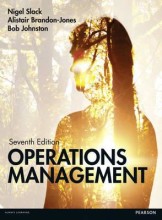Summary: Business Process Management
- This + 400k other summaries
- A unique study and practice tool
- Never study anything twice again
- Get the grades you hope for
- 100% sure, 100% understanding
Read the summary and the most important questions on Business process management
-
2 Operations performance
This is a preview. There are 3 more flashcards available for chapter 2
Show more cards here -
5 advantages effective operations management can give to the business:
1. It can reduce costs of producing products and services
2. It can achieve customer satisfaction through good quality and service
3. It can reduce the risk of operational failure
4. It can reduce the amount of investment
5. It can provide the basis for future innovation -
Externally and internally benefits of quality
Externally: quality is an important aspect of customer service
Internally: quality operations both reduce cost and increase dependability -
Externally and internally benefits of speed
Externally: speed is an important aspect of customer service
Internally: speeds both reduces inventories by decreasing internal throughput time and reduces risks by delaying the commitment of resources -
Externally and internally benefits of dependability
Externally: dependability is an important aspect of customer service
Internally: dependability within the operation increases operational reliability (saving time and money) and also gives stability to the operation -
Externally and internally benefits of flexibility
Externally:
1. Produce new products and services (product/service)
2. Produce a wide range or mix of products and services (mix)
3. Produce different quantities or volumes of products and services (volume)
4. Produce product and services at different times (delivery)
Internally: can help speed up response time, save time wasted in change overs and maintain dependability -
Externally and internally benefits of cost
Externally: low costs allow organizations to reduce their price in order to gain higher volumes or increase their profitability on existing volume levels
Internally: Cost performance is helped by good performance in other performance objectives -
3 Operations strategy
This is a preview. There are 2 more flashcards available for chapter 3
Show more cards here -
What is strategy and what is operations strategy?
Strategy: The total pattern of decisions and actions that position the organization in its environment and that are intended to achieve its long-term goals
Operations strategy: concerns the pattern of strategic decisions and actions which set a role, objectives and activities of the operation -
Operations strategy has content and process, what is the difference?
Content: concerns the specific decisions which are taken to achieve specific objectives
Process: the procedure which is used within business to formulate strategy -
What is the difference between a 'top-down' and a 'bottom-up' view of operations strategy?
The 'top-down' perspective views strategic decisions at a number of levels. Corporate strategy sets the objectives for the different businesses which make up a group of business. Business strategy sets the objectives for each individual business and how it positions itself in its marketplace. Functional strategies set the objectives for each function's contribution to its business strategy
The 'bottom-up' view of operations strategy sees overall strategy as emerging from day-to-day operational experience -
What is the difference between a 'market requirements' and an 'operations resources' view of operations strategy?
A 'market requirements' perspective of operations strategy sees the main role of operations as satisfying markets. Operations performance objectives and operations decisions should be primarily influenced by a combination of customer's needs and competitors' actions
The 'operations resource' perspective of operations strategy is based on the resource-based view (RBV) of the firm and sees the operation's core competences (or capabilities) as being the main influence on operations strategy.
- Higher grades + faster learning
- Never study anything twice
- 100% sure, 100% understanding
































